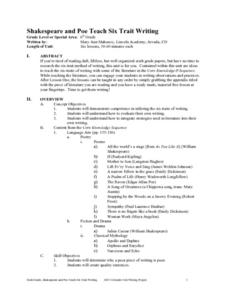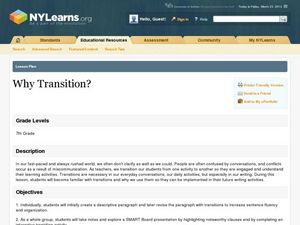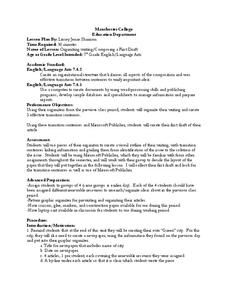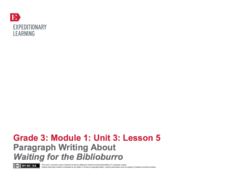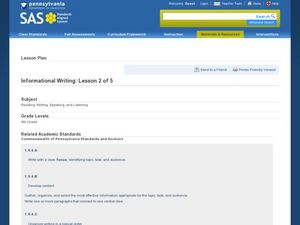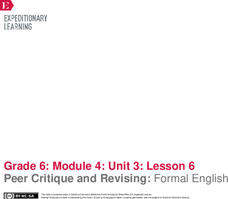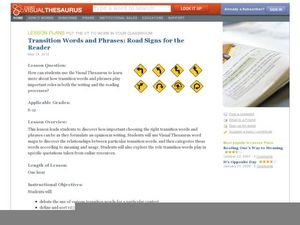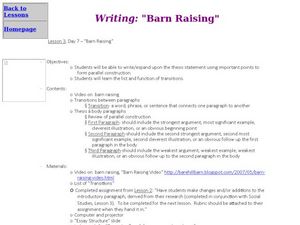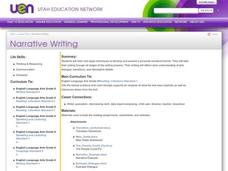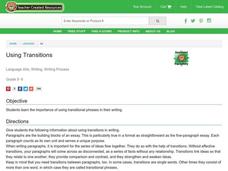Curated OER
Shakespeare and Poe Teach Six-Trait Writing
A Six-Trait Writing instructional activity helps your middle schoolers liven up their word choice and shows them how to evaluate their own writing. Class members take a close look at the language used in poems by Shakespeare, Kipling,...
California Department of Education
Transitioning to High School
How do scholars prepare to take their next big step? The second in a series of six career and college readiness activities focuses on making a smooth transition from middle to high school. Groups research the resources available at their...
Curated OER
Writing the Essay
Relate the structure of the essay to the structure of a building. The class compares an essay to a building, with the writer being the architect, the introduction being the foundation, and so on. They use the visual representation of a...
EngageNY
Writing the Argument Essay: Moving from Planner to Drafting
It's an easy transition. Scholars identify transition words in the Pygmalion model essay and record definitions in the Transitions anchor chart. They then begin to look at the tone of the model essay. Finally, individuals begin writing...
Curated OER
Topic Sentences and Transitions
High school writers identify the purpose of both a topic sentence and a transitional statement. They write a topic sentence which denotes the paragraph topic and the author's stand on that topic. Then they write an effective transitional...
Curated OER
Why Transition?
Help your class transition into better writers with this lesson, which guides them through the process of adding transitions to increase sentence fluency and organization. The activity is designed for a classroom with a SMART board, but...
Curated OER
Organizing Writing/Composing a First Draft
Does your language arts class have a hard time with writing transitions? Use this organizational writing lesson to create three effective transition sentences that middle schoolers will use in their research of renewable resources.
EngageNY
Paragraph Writing About Waiting for the Biblioburro
Ask your learners to synthesize what they know about Waiting for the Biblioburro by writing a well-organized paragraph. Young writers focus on using transition words and including specific details in their paragraphs. The plan allows for...
Curated OER
Persuasive Writing - Anticipating Opposing Views
Persuasion, when used effectively, is a powerful and effective tool. In groups, young writers develop a persuasive letter about something that they would like their parents to allow them to do. Then, independently, they use proper...
Pennsylvania Department of Education
Informational Writing: Lesson 2 of 5
Introduce expository writing to your elementary learners. Young authors write a three-paragraph informational paper using the steps of the writing process. They follow guided lessons to experience each of five steps. Included are tons of...
Curated OER
Organizing by Writing
Middle schoolers analyze how to use writing for generating and organizing their thoughts before communicating them. They use the questions on the first handout to organize a three-minute introduction of themselves to their small group....
Curated OER
Lesson Plan 17: Novel, Take 2
It's all about using peer resources in this writing process lesson plan, which includes a fantastic novel revision worksheet packet. Learners have read a partner's story draft the night before, and groups have a "lightning round of...
EngageNY
Peer Critique and Revising: Formal English
Dear Sir or Madam: What's the difference between formal and informal language? Scholars focus on using formal English and transitions in their position papers. After revising their rough drafts, they engage in the peer editing process...
Curated OER
Making an Argument: Effective use of Transition Words
Work on using transition words in context by prompting elementary and middle schoolers to write their own persuasive essays using transition words. They explore new forms of transition words and examine how they are used in an editorial...
Curated OER
Transition Words in Expository Writing
Create to learn! Your class can create posters of transitional words and phrases to help them compose an explanatory text. They work in groups and focus on one type of transition (time, place, importance, etc.). They also create a poster...
Curated OER
Transition Words and Phrases: Road Signs for the Reader
Therefore! However! Furthermore! Explore the power of transition words and phrases. Signal your readers by suggesting the relationship between different thoughts or points. Help them demonstrate an understanding of word relationships.
Curated OER
Writing: Barn Raising
Young writers compare writing a paper to building a barn. They write a thesis statement using parallel construction and use transitions to hold the paper (walls of the barn) together. A barn raising video link is included; great for...
Curated OER
How to Write an Essay: Secondary ed.
Whether introducing the structure of expository essays or reviewing the format with your high schoolers, take the time to check out this resource. Examples of seven common forms of introductory paragraphs and six types of conclusions, as...
Curated OER
Narrative Writing
Binoculars are used as a metaphor for good descriptive writing. Class members first view a small picture and then an enlarged view of the same image in which the details come into focus. Next, learners examine a paragraph lacking sensory...
Education.com
St. Patrick's Day Writing: If I Found a Pot of Gold...
This St. Patrick's Day, young writers imagine they found a pot of gold at the end of a rainbow. After a class discussion and brainstorming, scholars compose a narrative essay making sure they incorporate transitions and at least three...
EngageNY
Revising the Newspaper Article: Sentence Structure and Transitions
Take two. After a mini lesson covering sentence structure and transition words, scholars revise their End of Unit 3 Assessment based on feedback. Writers self-score their assessments against row three in the Newspaper Article Rubric.
Curated OER
Using Transitions
Students explore the importance of using transitional phrases in their writing. They discuss why transitions are important to their writing and various types of transitions that they can use. Students practice using transitions in their...
Curated OER
More Details and Transitions
Use details and transition words to enhance writing. Sixth graders examine their own writing and insert more details and transition words provided by their teacher. There is a list of 11 "Terrific Transitions," but brainstorm several...
Curated OER
How to Write A+ Essays!
This lesson, which promises to improve the essays of your middle schoolers, contains a list of characteristics an essay should include. It breaks it down into the introduction, thesis statement, body, etc. There's also a list of things...
Other popular searches
- Writing Transitions
- Using Transitions in Writing
- Writing Using Transitions
- Writing With Transitions
- Writing Transitions Words


